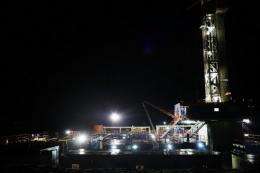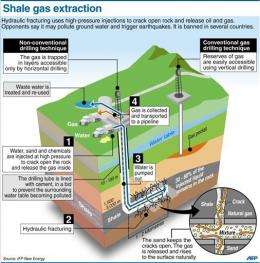Fracking can cause earthquakes, but risk is low: study

Certain oil and gas operations that involve injecting wastewater underground can cause earthquakes, but the risk from hydraulic fracturing is generally low, said a US scientific report Friday.
The report by the National Research Council found that the most significant risk of earthquakes is linked to secondary injection of wastewater below ground to help capture remaining hydrocarbons from a petroleum reservoir.
Also, a technique called carbon capture and storage that aims to reduce carbon dioxide emissions to the atmosphere by capturing, liquefying and injecting them below ground at high volumes, "may have potential for inducing larger seismic events," the report said.
But fracking, which offers the potential to unlock vast quantities of natural gas from shale formations and has come under intense scrutiny from environmentalists, was not a major risk factor for quakes that would be strong enough for people to feel, or above 2.0 magnitude, it said.
"The process of hydraulic fracturing a well as presently implemented for shale gas recovery does not pose a high risk for inducing felt seismic events," said Murray Hitzman, a professor of economic geology at the Colorado School of Mines and chair of the committee that authored the report.
A spokesman for the National Academy of Sciences said the committee members all passed a screening process to rule out potential conflicts of interest, and all agreed with the conclusions in the report.
There are 35,000 wells for shale gas development in the United States today, and only one case has been documented worldwide in which hydraulic fracturing for shale gas was confirmed as the cause of nearby earthquakes, it said.
That case was in the Blackpool area of England in 2011. Fracking was found to have caused a 2.3 magnitude quake in April and a 1.5 quake in May.

Hydraulic fracturing for shale gas production was cited as the possible cause of felt seismic events in Oklahoma in 2011, the largest of which was a 2.8 magnitude temblor, it added.
A total of 13 states have reported "seismic events caused by or likely related to energy development," the report said.
But it noted that a frequent problem in studying such events involves the small size of the quakes and data collection that is poor or lacking, often making confirmation of a link between fracking and earthquakes difficult.
Earthquakes related to primary oil and gas production were more frequent than in fracking -- such cases have been documented at 20 sites in the United States and 18 internationally.
But still, the number of cases was "uncommon relative to the large number of operating oil and gas fields worldwide," said the report.
A key factor in the potential to cause a quake appears to be related to the total balance of fluid introduced below the surface and removed from it, and technologies that control this balance are best, said Hitzman.
"Injection or disposal of wastewater derived from energy technologies into the subsurface does pose some risk for induced seismicity but very few events have been documented over the past several decades," he said.
The study did not examine water quality changes or any potential damage caused by such earthquakes.
Hitzman also noted that the committee found there are no specific regulations against oil and gas operations engaging in fracking over a fault in the Earth, and there are no US laws against causing an earthquake.
Carbon capture and storage (CCS) was singled out because proposed projects would involve injecting the largest volumes of fluids below the surface for long periods and therefore may cause bigger earthquakes.
However, there are no major CCS projects underway so the actual risk is difficult to assess, and more research is needed, the report said.
"Human activity, including injection and extraction of fluids from the Earth, can induce seismic events," it said.
"While the vast majority of these events have intensities below that which can be felt by people living directly at the site of fluid injection or extraction, there is potential to produce significant seismic events that can be felt and cause damage and public concern."
The report urged more research to address the gaps in current knowledge, more work on techniques to help predict such events, and better use of seismic instrumentation to collect data on risky earthquake sites in the future.
(c) 2012 AFP

















